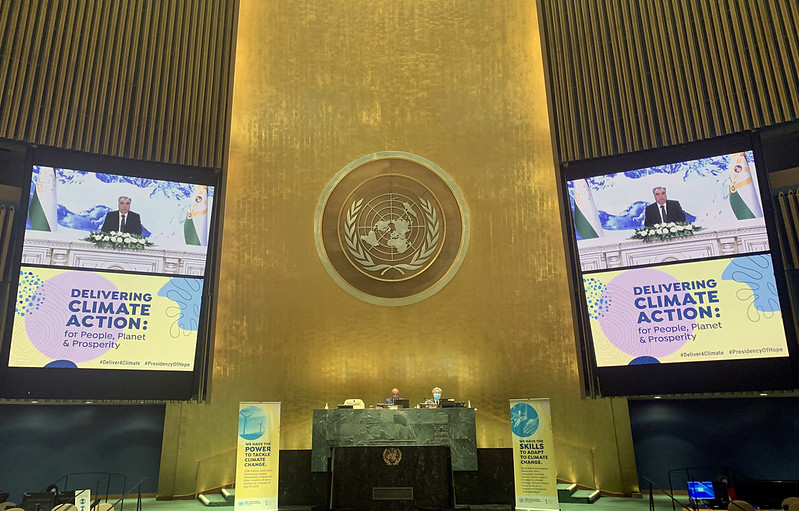 DUSHANBE, 27.10.2021 (NIAT Khovar) – In the framework of the Paris Agreement, Tajikistan made a voluntary commitment not to exceed the volume of greenhouse gas emissions from the 1990 level in the range of 80-90%. If international support is provided, this figure could drop to 65-75% of the baseline. This was stated today by the President of Tajikistan Emomali Rahmon at a high-level debate at the UN General Assembly on Climate Action.
DUSHANBE, 27.10.2021 (NIAT Khovar) – In the framework of the Paris Agreement, Tajikistan made a voluntary commitment not to exceed the volume of greenhouse gas emissions from the 1990 level in the range of 80-90%. If international support is provided, this figure could drop to 65-75% of the baseline. This was stated today by the President of Tajikistan Emomali Rahmon at a high-level debate at the UN General Assembly on Climate Action.
Panellists discussed how to overcome technical and financial challenges to succeed in the fight against global warming.
According to President Rahmon, Tajikistan’s contribution to global warming is minimal, since the country’s share in global emissions is only 0.0003%. Nevertheless, in the framework of the Paris Agreement, Tajikistan made a voluntary commitment not to exceed the volume of greenhouse gas emissions from the 1990 level in the range of 80-90%.
“In the case of international support, this figure can be reduced to 65-75% of the baseline,” President Rahmon noted.
He believes that the reduction of emissions mainly be achieved primarily through the continuation of the development of rich sources of renewable energy, such as hydropower and solar energy.
In his opinion, the integrated use of these two types of energy can help not only increase the production of clean renewable energy, but also contribute to the rational use of the country’s water resources.
“Taking into account the new aspirations of the global community to achieve zero greenhouse emissions, we intend to double our capacity to generate green energy by 2050,” President Rahmon said.
Currently Tajikistan generates 98% of electricity from hydroelectric power plants, and ranks sixth in the world in terms of the percentage of production and use of green energy. With the construction of new hydropower facilities, in particular the Roghun HPP with a capacity of 3,600 megawatts, Tajikistan will rise two positions in this rating.
Rahmon said that in accordance with the Paris Agreement, Tajikistan has recently prepared and submitted to the UNFCCC Secretariat an updated version of the Determined National Contribution on Greenhouse Gas Emissions.
The high-level debate, during which about 70 speakers spoke from the rostrum of the General Assembly, took place on the eve of the climate conference in Glasgow, where President of Tajikistan was also invited. The main goal of the conference is to agree on measures that will keep global warming within 1.5 degrees Celsius, as required by the Paris Climate Agreement.


